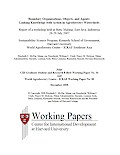| Working Paper Series |
 |
|
| Title | Boundary organizations, objects, and agents: linking knowledge with action in agroforestry watersheds | | Author | Elizabeth C. McNie, Meine van Noordwijk, William C Clark, Nancy M. Dickson, Niken Sakuntaladewi, S. Suyanto, Laxman Joshi, Beria Leimona, Kurniatun Hairiah and Noviana Khususiyah | | Year | 2008 | | Publisher | World Agroforestry Centre (ICRAF) | | City of Publication | Nairobi, Kenya | | Series Number | Working Paper No. 80 | | Number of Pages | 41 | | Call Number | WP0127-10 | | Keywords | sustainable development, environmental policy, sustainability, boundary work, boundary organizations, agroforestry systems, watersheds |
|
| Abstract: |
| On July 26-29, 2007, researchers, scholars, and practitioners convened at Brawijaya University in Malang, East Java, to share, learn about, and discuss, preliminary findings from a research project conducted by the World Agroforestry Center (ICRAF) South Asia and the Sustainability Science Program at Harvard University called, “Integrating knowledge and policy for the management of natural resources in international development: The role of boundary organizations.” Scholarship in the north/west
theorizes that boundary organizations, and their compliments of boundary objects, boundary work, and boundary agents, enhance the linkages between various forms of knowledge (e.g., scientific, indigenous, political) and action (e.g., policies, behavioral changes, decisions), thus increasing the usefulness of information for decisions and therefore improving outcomes. The ICRAF/Harvard research sought to explore how well these northern/western concepts apply in the challenging context of linking knowledge with action in Indonesian agroforestry problems. Specifically, they researched an ICRAF program called RUPES (Rewarding Upland Poor for Environmental Services).
The purpose of this workshop was threefold:
• The ICRAF/Harvard research team wanted to share their initial assumptions about the role of boundary organizations as understood from northern/western literature;
• The ICRAF/Harvard team wanted to learn from the expert scholars and practitioners gathered for the workshop experience in linking knowledge with action for sustainable agroforestry and watershed management based on their own experiences and research in Indonesia.
• The ICRAF/Harvard team wanted to synthesize the initial findings from their research with perspectives of the workshop attendees in order to inform the research project and thus broaden their understanding of the role of boundary organizations in sustainable development in Indonesia.
Findings from the workshop indicated that significant differences exist between northern/western notions of boundary organizations, boundary work, and boundary agents and the RUPES (Rewarding Upland Poor for Environmental Services) model. These findings suggest that future efforts to link knowledge with action for sustainable development should consider the following observations when designing their institutions and organizations to achieve desired policy objectives. What follows is a summary of the most important discoveries from the workshop. |
|
|
Download file(s): Click icon to download/open file.
|
| |
File Size |
Description |

|
1,420 KB |
Softcopy |
|
|
GRP 6: Developing policies and incentives for multifunctional landscapes with trees that provide environmental services
|
| Viewed in 3637 times. Downloaded in 982 times. |